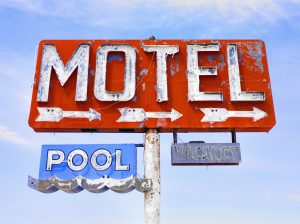As our readers know, any construction project associated with a federal agency such as the Department of Transportation or Federal Transit Administration must comply with the requirements of the National Environmental Policy Act (NEPA). In Quicker But Less Dirty: The Biden Administration Both Streamlines and Seeks to Expand NEPA Environmental Review, written for the ABA Construction Forum’s Construction Lawyer journal, colleague Elaine Y. Lee provided a high-level overview of NEPA, its origins and current framework, criticisms, and prior administrations’ attempts to reform the law, before proceeding to examine two sets of changes to NEPA proposed by the Biden Administration that are arguably diametrically opposed.
Real Estate & Construction News Round-Up 04/06/22
A growing proptech startup aims to pre-emptively identify needed home repairs, 3D-printed homes could become a workable solution to the housing shortage, and more.
Landlords Beware: When Tenants Are Sanctioned
The listing of Specially Designated Nationals (SDNs) has the potential to impact any American doing business with a named party, including landlords who lease real estate to sanctioned persons. In “Specially Designated Nationals as Tenants: How Landlords Can Be Impacted by Sanctions Against Russian Nationals,” Nancy A. Fischer, Rachel B. Horsch, Anne C. Lefever, Zachary C. Rozen and Samantha Franks explain how sanctions designations may require U.S. persons involved with sanctioned individuals to terminate existing contracts, including leases, and why it is important for landlords to conduct thorough due diligence on prospective tenants and to negotiate language that enables them to quickly terminate a lease if a tenant becomes subject to sanctions.
Real Estate & Construction News Round-Up 03/30/22
Office vacancy rates are on the rise, 3D printing technology will be used to build a portfolio of affordable homes, resources from the Biden Administration’s Infrastructure Bill are projected to speed up the creation of “smart cities,” and more.
Environmental and Regulatory Law Update: New Federal and State Rulings
The first quarter of 2022 has yielded a number of decisions, reversals and agency adjustments worth note.
FEDERAL CIRCUIT
U.S. Court of Appeals for the D.C. Circuit – Food & Water Watch v. Federal Energy Regulatory Commission
On March 11, 2022, the court decided the FERC case. On December 19, 2019, the Commission issued a Certificate to Tennessee Gas Pipeline and determined that a “modest expansion” and upgrade of the existing 11,000-mile natural gas pipeline would have no significant environmental impact. However, one of the Commissioners filed a partial dissent, arguing that the Commission’s treatment of the climate change impacts was inadequate. A petition for review was filed, and now the court has decided that the Commission erred in not accounting for the indirect effects of the expansion, namely the downstream emissions of greenhouse gas generated by the pipeline’s delivery of the gas to its customers. Consequently, NEPA’s requirement that a rigorous environmental assessment be made before the authorization was granted was violated. However, the court decided against vacating the Commission’s orders, which would have had a “disruptive effect” on the project which is, or soon will be, operational.
Is a By-the-Hour Motel a Single Asset Real Estate for Chapter 11 Purposes?
 Single asset real estate (SARE) is a unique classification under the Bankruptcy Code with implications for both debtors and lenders. SARE classification is apparent for a property such as a shopping center, apartment complex or office building where the debtor’s income is generated exclusively from real estate operations, but is less apparent for a hospitality property where the debtor may provide incidental services. Although a full-service hotel with a pool, fitness center and restaurant is not a SARE property, recent trends indicate that even hourly motels offering little-to-no onsite amenities may not qualify for SARE classification. Because SARE classification is viewed as providing lenders with distinct advantages in a chapter 11 case, property owners seeking chapter 11 protection to reorganize often try to avoid that classification, while lenders seek to impose it through sometimes costly litigation.
Single asset real estate (SARE) is a unique classification under the Bankruptcy Code with implications for both debtors and lenders. SARE classification is apparent for a property such as a shopping center, apartment complex or office building where the debtor’s income is generated exclusively from real estate operations, but is less apparent for a hospitality property where the debtor may provide incidental services. Although a full-service hotel with a pool, fitness center and restaurant is not a SARE property, recent trends indicate that even hourly motels offering little-to-no onsite amenities may not qualify for SARE classification. Because SARE classification is viewed as providing lenders with distinct advantages in a chapter 11 case, property owners seeking chapter 11 protection to reorganize often try to avoid that classification, while lenders seek to impose it through sometimes costly litigation.
Real Estate & Construction News Round-Up 03/23/22
New home construction projects experience the fastest growth rate since 2006, President Biden signs the Consolidated Appropriations Act of 2022 into law, big U.S. hotel chains place developments in Russia on hold, and more.
The Emperor Has No Clothes: What We Learned About Hotel Brands During the Pandemic
 Branded hotel managers are not bad people, but they’re sometimes bad managers if profitability is your objective. If you noticed that operating margins improved when brand standards were relaxed during the pandemic, and when the brands were forced to reduce corporate charges, you’re not alone. The brands will suggest that these were temporary measures reflecting their concern for their owners. But there were some important lessons learned during the pandemic—including some that are not often spoken about at hotel conferences—that astute owners and their asset managers should not soon forget.
Branded hotel managers are not bad people, but they’re sometimes bad managers if profitability is your objective. If you noticed that operating margins improved when brand standards were relaxed during the pandemic, and when the brands were forced to reduce corporate charges, you’re not alone. The brands will suggest that these were temporary measures reflecting their concern for their owners. But there were some important lessons learned during the pandemic—including some that are not often spoken about at hotel conferences—that astute owners and their asset managers should not soon forget.
Point Taken: The UK Supreme Court Finally Confirms the General Law of Liquidated Damages (LDs)
In a long-awaited decision which overturned the Court of Appeal’s ruling in the Triple Point Technology vs PTT Public Company case, the UK Supreme Court confirmed the general law of LDs, which is that—absent clear words to the contrary—they accrue up to the date of termination of a contract regardless of whether the contractor completes the work; after that, general damages are recoverable. This approach was held to reflect “commercial reality and the accepted function of liquidated damages.” Although the contract in question was not a construction contract, the decision is equally relevant in the construction sphere.
Real Estate & Construction News Round-Up 03/16/22
The popular term “PropTech” is projected to disappear as real estate digitization continues, the impact of the Russia-Ukraine conflict on the U.S. housing market is analyzed, China’s home prices continue to fall, and more.




